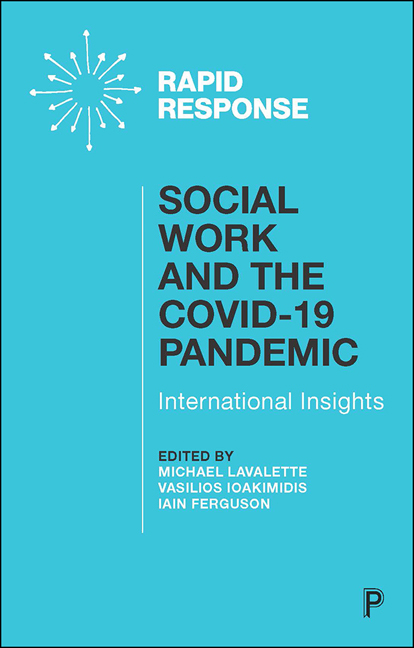3 - Neoliberal Social Work and COVID-19
Published online by Cambridge University Press: 23 March 2021
Summary
28 April 2020 was International Workers Memorial Day (IWM). It's an annual event organised by trade unions to commemorate the many thousands of workers who have died unnecessarily and too young as a result of government or employer negligence, through industrial accidents or through avoidable industrial diseases like asbestosis.
In 2020, IWM Day was a bit different. For this year we observed a minute's silence for all the frontline workers – health workers, care workers, bus drivers, shop workers and social workers – who have lost their lives due to COVID-19. It was not, however, as British Prime Minister Boris Johnson tried to suggest, a “day of national unity”. For many of these frontline workers will have died as a direct or indirect result of his government's failure to prepare adequately for the crisis or to provide adequate personal protective equipment.
The slogan of International Workers Memorial Day is ‘Remember the dead, fight for the living’. We should remember the dead and one role of social work is to help people deal with the pain of loss. But in this short contribution I want to look at what kind of role social work might play in ‘fighting for the living’ in the face of this crisis.
In Part II of this book, contributors from Greece, Chile, South Africa and elsewhere report on the new and imaginative ways that social workers are developing practice to keep in touch with service users during the crisis, to reduce social isolation and protect mental health. There have also been accounts of social workers making links with the new mutual aid organisations that are springing up everywhere. These are important and positive developments.
But we have also heard another less positive side to this picture, because many social workers have reported that in their agencies it's ‘business as usual’. That rather than responding in new and creative ways to this wholly unprecedented situation, there is still the same management preoccupation with meeting budgets and targets, the same emphasis on monitoring, surveillance and risk rather than on working with service users to help them meet their needs and address their difficulties. Others still have talked about social work being ‘invisible’ in the current crisis.
- Type
- Chapter
- Information
- Social Work and the COVID-19 PandemicInternational Insights, pp. 25 - 30Publisher: Bristol University PressPrint publication year: 2020

